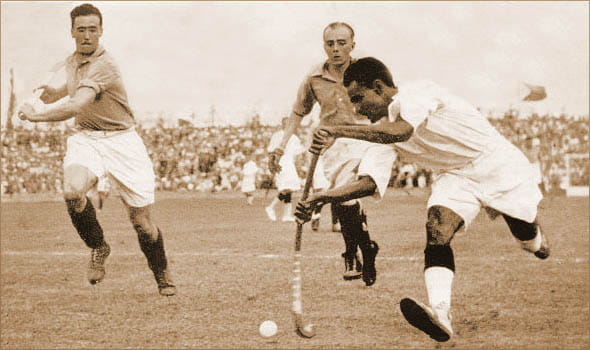In a 22-year-long career, Dhyan Chand scored over 400 goals and was part of three Olympics gold-winning Indian Hockey teams.
New Delhi: Every generation grows up with its own set of heroes — from politics, sports or culture. Hockey ‘wizard’ Major Dhyan Chand is one such Indian hero.
Tales from the life of Chand, known to have scored over 400 goals in a 22-year-long career, have been told and retold so many times over that the line between fact and fiction have blurred now.
“My earliest recollection of Dhyan Chand is from a newsreel about the 1936 Berlin Olympics. I saw it in a local cinema in Moga when I was 12 years. I remember seeing the goals being scored on screen and thinking to myself, that someday I will score even more goals,” said former India captain and three-time Olympic gold medallist Balbir Singh Dosanjh.
On National Sports Day, celebrated on Chand’s birthday, here’s a quick throwback to how the country’s greatest hockey player dominated the golden era of Indian Hockey.
Also read: India’s greatest living hockey player says team has great chance at Asiad & Olympic glory
The moon rise
Born as Dhyan Singh in Allahabad in 1905, Chand took after his father and joined the Indian Army in 1922. He was 16 at the time. It was in the army barracks that Chand’s relationship with hockey began.
A modest affair at first, Chand initially played with his fellow soldiers in regimental matches. Strapped for time as a full time soldier, Chand would, however, find his way to field every night at moonrise.
Things soon took a professional turn after he was selected to the Indian hockey team for a tour to New Zealand in 1926. Chand was responsible for over 100 of India’s 192 goals scored on tour through 21 matches (India won 18, drew 2 and lost 1).
The team’s first ‘gold’ win came at the 1928 Olympics in Amsterdam, Netherlands. As India acquired the hockey throne under the leadership of Jaipal Singh, it was Chand who emerged as the crown-prince. As the top scorer of the tournament, he ended up with 14 goals, including 2 against Holland in the final.
The second victory followed four years later at the Los Angeles Olympics in 1932. It was during this tour that India notched a record by beating the US 24-1. (The record for India’s biggest international win was finally trumped last Wednesday as the team beat Hong Kong China 26-0 in the Asian Games that are currently underway.)
Chand was the second highest scorer for the Indian team with 8 goals, two less than his brother Roop Singh.
The iconic 1936 Olympic final
At the now famous 1936 hockey final against Germany, the Indian team trembled with unease. They had, after all, suffered savage defeat at the hands of the Germans in an earlier practice match. Under pressure as captain, Chand, the jaadugar (wizard) of the team, felt that his spiked shoes had become a burden. Wearing just rubber soles in a game where feet can literally become your Achilles heel, Chand then led the Indian team to victory by scoring three crucial goals and sacrificing a tooth for the cause, giving the country its third hockey gold.
His stellar performance earned Chand a meeting with German leader Adolf Hitler. As legend goes, Hitler offered him a higher rank in the German Army which Chand is said to have declined with a polite smile. However, in his autobiography Goal, he made no reference to this story.
The 1936 tournament turned out to be Chand’s last Olympic appearance.
Post glory days
After returning from the tournament, till the war began in 1939, Chand mostly played army tournaments.
“I remember playing against Dhyan Chand during the Second World War. He was posted in Ferozepur in Punjab, and I was with the Punjab police. We used to have monthly ceremonial matches. These were organised by Gian Singh Kahlon (father-in-law of chief minister Captain Amrinder Singh), who was the district collector during those days. Chand was captain of the army team and I captained the civilian side. We always won,” recalled Balbir ‘Senior’, as Dosanjh is popular known.
The wizard played his last prominent international match in 1947 after the Asian Sports Association of East Africa made a request that he accompany the team for a tournament. Chand captained the team and, despite being in his forties, scored over 60 goals in 22 matches.
Also read: This tribal leader who opposed prohibition also led India to first Olympic hockey gold
He dabbled with coaching for some time during his army tenure and eventually retired with the rank of a Major in 1956. He then went on to become the chief coach at the National Institute of Sports (NIS), Patiala.
He settled down in Jhansi after retiring from the sport. And as it happens over time, new heroes replaced old ones.
Chand died on 3 December 1979 at the All India Institute of Medical Sciences (AIIMS), New Delhi.
An enduring legacy
In 1995, Chand’s birthday was declared as National Sports Day. In his honour, the National Stadium in New Delhi was renamed Major Dhyan Chand National Stadium in 2002. In the same year, a national award for lifetime achievement in Indian sports was also instated in Chand’s name.
However, calls to posthumously confer a Bharat Ratna on him have remained unsuccessful.
“I don’t understand why we wait to celebrate players till after they are gone? Are we assuaging our own guilt? Dhyan Singh died a bitter man, unsung till after his death,” said Balbir Senior.
“Due recognition is like a tonic to a sports person. People, the teams who have won for the country deserve credit,” he added.







Major Dhyan Chand is the god of hockey for India